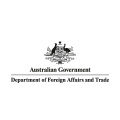Department of Foreign Affairs and Trade
Department of Foreign Affairs and Trade 2020 Policy Graduate Program
Opportunity expired
Opportunity details
- Graduate Job
- $65,000 - $69,999 / Year
- $65,000 - $69,999
- Apply by 25 Mar 2019
ABOUT THE PROGRAM
Our two-year policy graduate program will kick-start your career in DFAT. During the course of the program, you will undertake a tailored learning package delivered through the Diplomatic Academy. You will develop a broad knowledge and understanding of the Government's foreign, trade and aid policy priorities. You will complete four work placements, giving you first-hand experience of the department's diverse range of priorities, including:
- bilateral economic and political relations;
- international trade negotiations, investment and economic analysis;
- humanitarian assistance;
- development and aid program management;
- international security;
- public diplomacy;
- commercial, administrative and international law; and
- multilateral and global issues.
The policy graduate training program includes a block of courses designed to build on and give graduates the opportunity to fill gaps in their academic studies. There are workshops to develop graduates' presentation and negotiation skills, as well as courses in human rights, diplomacy, international development, financial management, public diplomacy, and consular services. Graduates also have an opportunity to train with peers from other countries and travel interstate to make calls on peak industry bodies and government officials.
After you have successfully completed the program, you will be promoted to an ongoing APS 4 position in Canberra. You will also be eligible to apply for positions in one of our overseas posts, although it can be a few years before graduates take up overseas positions.
ELIGIBILITY REQUIREMENTS
To be eligible for the DFAT graduate programs:
- you must be an Australian Citizen at the time of application; and
- you must have finished at least a three year bachelor degree by 31 December 2019; and
- you must have at least a credit average or above; and
- your most recent degree must not be more than five years old on the date you lodge your application.
You must also be willing to obtain and maintain a Negative Vetting Level 2 security clearance.
About the employer

Department of Foreign Affairs and Trade AU
3.8
1,000 - 50,000 employees
Government & Public Service
Our two-year graduate programs will kick start your career in the Department of Foreign Affairs and Trade (DFAT). In 2020, DFAT will offer two graduate programs based in Canberra: policy and management.
Pros and cons of working at Department of Foreign Affairs and Trade AU
Pros
Interesting subject matter and travel opportunities.
The small numbers of people working on big issues
Good culture, unmatched conditions in terms of work opportunities overseas
Opportunities to travel, diverse range of work, interesting insights into foreign policy
Working with excellent and inspirational people, working on a very interesting subject matter that is highly relevant to high-profile national and international issues.
Cons
Hierarchical, micromanagement, slow promotion, no posting opportunities, no language opportunities
Extremely hierarchical, very slow progression, areas protective of "good work", low levels of trust of graduates, too little work/responsibility allocated, hypercompetitive
Bureaucratic, organisation has limited engagement with or assistance for officers re achieving career goals, patronage
Work can be slow, travel and posting opportunities are diminishing by the year, opportunities for autonomy and innovation in work are minimal, work is largely reactive not strategic, most work is process-based, chronically under-resourced.
High degree of uncertainty about postings and career progression